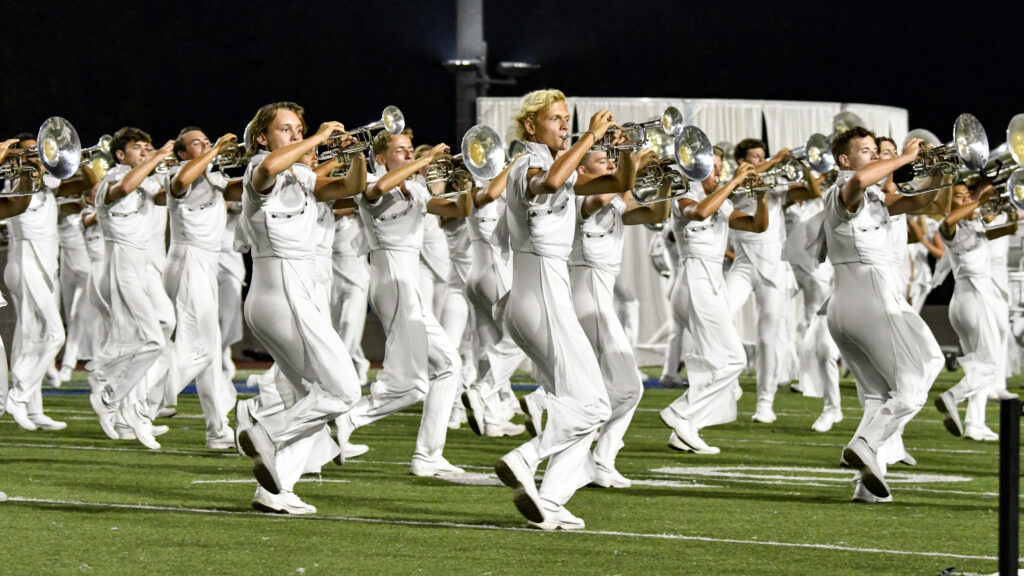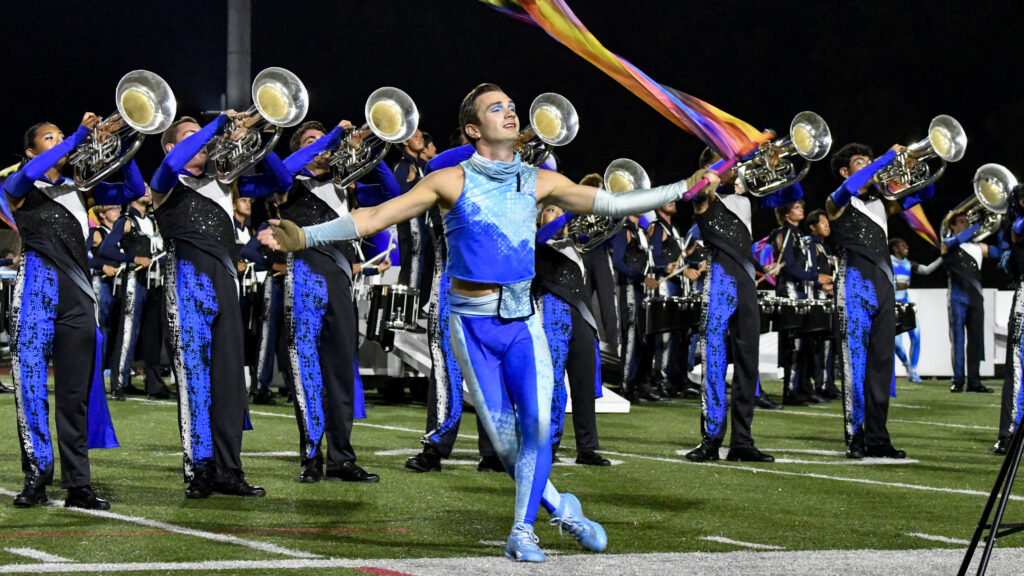 Since 1985, the Drum Corps International Hall of Fame has honored individuals who have left their mark on the world of marching music. From instructors to designers to innovators, administrators and others, today’s Hall is made up of more than 100 men and women influential in the history of drum and bugle corps. Each winter, members of the drum corps community participate in a nomination process, informing DCI’s Hall of Fame Committee of those whom they feel should be recognized as part of drum corps’ legacy. In April, current Hall of Fame members and corps directors participate in an election process to decide who will join the ranks of this prestigious society. Five individuals have been selected for induction as the DCI Hall of Fame Class of 2014. They will be recognized during the week of the DCI World Championships in Indianapolis this August.
Since 1985, the Drum Corps International Hall of Fame has honored individuals who have left their mark on the world of marching music. From instructors to designers to innovators, administrators and others, today’s Hall is made up of more than 100 men and women influential in the history of drum and bugle corps. Each winter, members of the drum corps community participate in a nomination process, informing DCI’s Hall of Fame Committee of those whom they feel should be recognized as part of drum corps’ legacy. In April, current Hall of Fame members and corps directors participate in an election process to decide who will join the ranks of this prestigious society. Five individuals have been selected for induction as the DCI Hall of Fame Class of 2014. They will be recognized during the week of the DCI World Championships in Indianapolis this August.
Mark Arnold Executive Director, Blue Knights

Mark Arnold is one of the longest-serving leaders in Drum Corps International today, having been corps director of the Blue Knights since 1985. Getting his start as an instructional staff member with the Troopers, Arnold soon took on the role of tour director for the Wyoming drum corps.
Under the tutelage of DCI Hall of Fame member Jim Jones, he learned the ins and outs of what it takes to successfully operate and get a drum corps down the road every summer. In nearly 30 years on the job with the Blue Knights, Arnold has relied on a steadfast can-do, never-give-up attitude to completely transform the Blue Knights organization into a multifaceted performing arts entity. Today the Blue Knights is just one of multiple ensembles under the umbrella of the Ascend Performing Arts organization.
In addition to operating the drum corps and an indoor percussion program, Ascend annually supplies performing groups for the NFL’s Denver Broncos, including a drum line and brass ensemble. Leading the Blue Knights from 31st place in the 1980s, Arnold called on notables like DCI Hall of Fame members George Zingali, Ralph Hardimon and Jay Bocook to staff his corps and bring it to a new level of greatness.
By 1991 the Blue Knights found themselves as a DCI World Championship Finalist, and have enjoyed a spot among DCI’s “Top 12” nearly every year since. But the drum corps experience for Arnold has never been solely about the competition. “Mark’s goal has consistently been to transform hard-working youth into high performance adults through the lessons that only competitive musical performance provides,” longtime Blue Knights volunteer Thelma Fung said.
Blue Knights board president Ken Adams says, “Our staff members over the years have clearly been directed by Mark to understand that the kids are number one.” Arnold has tirelessly worked to support those kids and consequently left a lasting impression on more than 6,000 youth from around the world in those years. “It’s not uncommon to see 40-year-old men and women hugging Mark and thanking him for personally saving or changing their lives,” Adams said. “He has provided endless council going far beyond his responsibilities as corps director, also serving as a father figure, friend and confidant whenever needed.”
In addition to shaping the course of the Blue Knights, Arnold also has played an integral role in the ongoing development and successes of Drum Corps International as a collective. He served as chairman of the DCI Board of the Directors in 1994 and again from 2008 to 2013. Arnold was honored as the inaugural recipient of the George Bonfiglio Chairman’s Award at the 2012 DCI World Championships, which is given to an individual each year who demonstrates extraordinary leadership and service on behalf of DCI and its performing drum corps.
Bill Cook Founder, Star of Indiana

A self-made titan of industry, Bill Cook built his Cook Medical company from the ground up in a small Bloomington, Ind. apartment, starting with a $1,300 loan, some basic tools to make angioplasty catheters, and a single card table he took to trade shows to display his work.
A little over 20 years after founding the company, he decided to start a drum corps. Few could imagine the impact Star of Indiana would have on the drum corps activity during its run at the DCI World Championships from 1985 to 1993, nor the further influence it would have as the Tony Award-winning production, “Blast!” Even as a busy executive, Cook took great joy in watching Star of Indiana members learn, excel and do great things, often dressing in costume to fit the theme of the corps’ productions. “He was a hands on leader, mentor and participant in the daily life of the drum corps,” said former drum major Becky Wood Saddlemire. “He drove a bus, cheered for us in the stands and wouldn’t hesitate to ‘pull up some curb’ to talk with the members during meal time.”
Cook was often scorned as the man behind the “best corps money could buy,” but in reality, he simply ran Star of Indiana as a legitimate business. The corps needed to travel in the summer, so he founded a charter bus company and travel agency to handle the logistics, and even more importantly, to operate year-round to raise additional money for Star of Indiana. In doing so, Cook created the model for how today’s drum corps are run as businesses, utilizing their assets to reach out and create programs that help the corps survive. “To be sure, Bill Cook was a formidable personality with strong opinions,” 2013 DCI Hall of Fame inductee Steve Rondinaro said. “You don’t succeed at his level in the business world otherwise. He’d be the first to tell you he rubbed some people the wrong way in and out of the drum corps activity, but you knew where he stood and his heart was always in the right place.”
Cook’s heart was in the place of doing whatever he could to take care of and provide opportunities for young people who were engaged in the drum corps experience, whether or not they were marching as members of Star of Indiana. DCI staff writer Michael Boo recounts that when the 27th Lancers fleet was mired by mechanical problems, Cook sent buses from his own Star of Indiana fleet to pick up the stranded corps members.
When the Cavaliers’ food service trailer was destroyed by fire while on the road in the middle of summer, Cook sent Star of Indiana’s food truck to the corps to get it through the season. When the Troopers fell on tough financial times, Cook arranged for his friend John Mellencamp to fly to Wyoming to perform a benefit concert for the corps. “Bill loved drum corps. All drum corps,” longtime DCI television producer Tom Blair said. “He and his wife Gayle arrived at drum corps shows early and sat in the stands from the first corps to the last. He saw the positive influence of the drum corps experience and provided that experience to as many people as possible.” Passing away in April of 2011 at the age of 80, Cook will be inducted in the DCI Hall of Fame posthumously.
Timothy Salzman Brass arranger, Guardsmen, Santa Clara Vanguard, Cavaliers
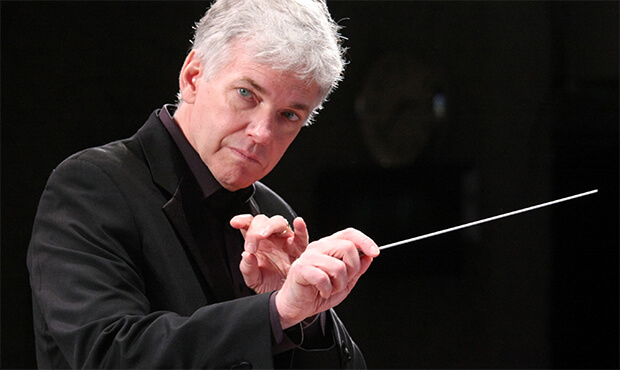
In an age when drum and bugle corps weren’t regarded with much reverence for their musicality and the number of music education majors in a performing group could be counted on one hand, Timothy Salzman used his background in education and as a wind band expert to bring the same levels of musicianship of a concert ensemble onto the football field. Getting his start with the Guardsmen of Schaumburg, Ill.
in 1978, Salzman quickly turned the group’s brass section into a top-performing ensemble. Joining the staff of Santa Clara Vanguard in 1981, Salzman helped the corps win a World Championship title in his first year with the group. Consulting with the Cavaliers in the 1980s and arranging exclusively for the corps from 1989 to 1997, he would help establish an identity for the Green Machine that focused the group’s musical efforts on concert band and wind ensemble literature. “Tim taught kids like me that the highest standard of musicianship really did matter,” says Dean Westman, who was a member of the Cavaliers during Salzman’s tenure and one of the few music education majors in the corps at the time.
“Whether you were playing clarinet in his university wind ensemble or contra bugle in the Cavaliers, Tim expected excellence.” Westman remembers fondly just how hard Salzman pushed him and his fellow corps members to achieve when they were deep in the heart of Texas for the 1991 DCI World Championships. “[Salzman] was teaching us that the work is more important than the trophy,” Westman explained. “On one of the water breaks that he gave us, seeing that we were all physically exhausted, Tim came down to the field, stood by the water jugs and individually served each of us.
He handed us our cup of water, he looked each member straight in the eyes and said, ‘Thank you.’ Perhaps it was a small gesture, but it’s one that has stuck with me for almost 25 years.” The work ethic Salzman helped install among corps members paid off in spades. The Cavaliers would win their very first World Championship title in 1992, and another soon followed in 1995. While Salzman last worked with the Cavaliers in 1997 and subsequently made a move away from the drum corps arena, he has become extremely well known in academia.
As a professor of music at the University of Washington for decades, he has traveled the world as a conductor and arranger for various ensembles and is a published author. Whether conducting in the concert hall or instructing drum corps members from a football stadium press box, DCI Hall of Fame member James Campbell says that Salzman has done it all with distinction. “He inspires those under his direction to reach their highest potential,” Campbell said. “His life-long passion to share music with young people and audiences around the world has left a lasting impression on countless students and colleagues with whom he has crossed paths.”
John Simpson Brass instructor, Bridgemen, Sky Ryders, Star of Indiana
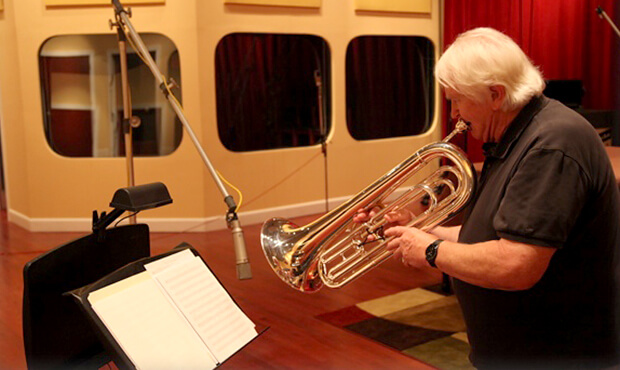
First and foremost an educator, John Simpson’s top priority when teaching a brass section—whether for the Bridgemen, Sky Ryders, Star of Indiana or others—was on playing with excellent tone quality and intonation. “His brass sections had an unmistakable vibrancy of tone and always played with good tuning,” said Chris Knighten, a Sky Ryders alum who now serves as director of bands at the University of Arkansas.
“The resulting ‘Simpson Sound’ was powerful, full of dynamic extremes and incredibly musical and entertaining.” “From 1979-1983, John arguably produced some of the best horn lines in DCI, regardless of overall corps placement,” said Santa Clara Vanguard brass arranger JD Shaw who is a former member of the Sky Ryders. “The technical prowess and connection with the audience were second to none.”
Joining the United States Air Force Drum and Bugle Corps in the 1960s and soon after the New York Skyliners, Simpson helped lay the groundwork for developments in bugles that at the time were rudimentary compared to today’s instruments; regulated to single valves that limited the number of notes that could be effectively played. With DCI Hall of Fame member Robert “Pepe” Nataro, Simpson worked to develop a new “slip-slide” technique for bugle playing that incorporated the use of valve and valve-slide combinations to allow brass musicians to play through more notes on their instruments.
As an arranger collaborating with the likes of DCI Hall of Fame member Larry Kerchner, Simpson used those new techniques and note combinations to create harmonies never before heard on the drum corps field. “John helped fashion arrangements that incorporated key signatures that allowed for more chromaticism, resulting in a much richer harmonic palette than heard from most corps in that era,” Knighten said.
Whether helping to develop new instruments like the King contrabass bugle first used by the Sky Ryders and Blue Devils in the early 1980s, or pushing for changes in the DCI adjudication system to reward corps that made musicianship a top priority, Simpson set new standards in drum corps brass playing while influencing a whole generation of musicians and future educators. “[John] was a true devotee to proper brass pedagogy and was immovable in his standards of excellence,” says Shaw. “To this day, as a professional performer, I regularly refer back to his tenets of sound production, listening and musical nuance.”
Kevin Smith Founder, Carolina Crown
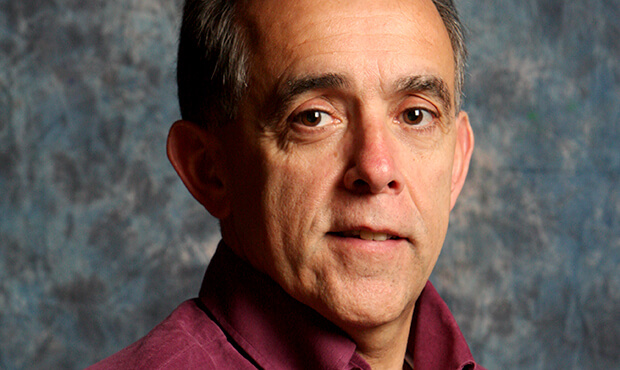
The rise and development of the Carolina Crown drum corps is perhaps one of the greatest examples of the Aesop fable of the tortoise and hare, where “slow and steady wins the race.” Kevin Smith has led the organization from the starting line to the finish and beyond. Along with a group of drum corps alums and supporters, Smith formed the Charlotte Drum Corps Association (CDCA) in 1988 to run an annual competition in the North Carolina city. Soon after, members of the CDCA had the idea to start their own drum corps ensemble. Smith agreed to be the interim director of the corps until a permanent director could be found, though nobody ever was. With a background in risk management and a full-time job in insurance, Smith chose to run and grow Carolina Crown in a slow, gradual and calculated way. “Kevin didn’t take unnecessary risks, didn’t spend money he didn’t have and was always thinking of how he could improve the experience of the corps members, all while staying on budget,” said former Carolina Crown assistant director Terry Valentine. “He grew the organization in a measured way … carefully building the foundation that would carry them through decades.” For 20 years Smith led the group, seeing the corps through its first DCI World Championship title in 1993 as a Division II unit, to its move up to DCI’s World Class division with years of further growth and competitive success. He did all of this as a volunteer, in between raising a family and holding a nine-to-five job. When Carolina Crown grew to a point where a full-time director of the organization was needed, Smith stepped into the role of board president in 2010, handing the reins of the day-to-day and creative side of the drum corps operation to current director Jim Coates. But as DCI Hall of Fame member Steve Rondinaro says, “Crown is Kevin and Kevin is Crown.” Smith still travels throughout the summer with the corps and was on the sideline at Lucas Oil Stadium in Indianapolis as Carolina Crown won its very first World Class World Championship title in 2013. “His dedication, consistency and just plain love have brought Carolina Crown to where it is today,” Valentine said. “A world class organization dedicated to young people and their performance both on and off the field.”



